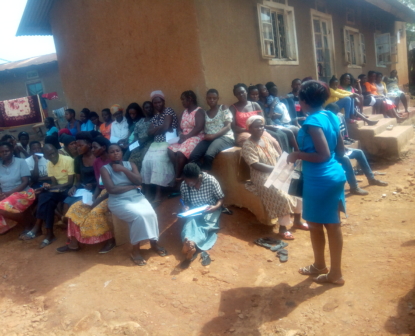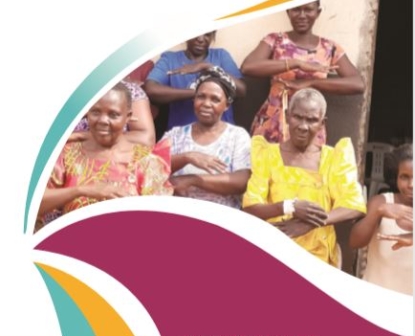Project
Ending Exploitation and Abuse of Youth & Female Domestic Workers
-
Amount Funded
148,588 EUROProject Duration
01 Dec 2018 - 31 May 2020 -
-
Lead organisation
-
The Platform for Labour Action (PLA) is a registered Non-Government Organisation founded in 2000 by a group of three female activists due to the absence of a voice to advocate for the rights of vulnerable and marginalised workers. The organisation provides specific intervention to promote and protect the rights of undocumented women, youth and children in the informal sector. The Platform for Labour Action advocates for the revision of the minimum wage. The Organisation has been successful in influencing the Ministry of Gender, labour and Social Development to make pronouncements that domestic workers will soon have a standardised employment contract. Part of their advocacy work for the Expansion of the Senior Citizens Grant in Uganda resulted into the Government of Uganda taking a decision to roll out the Senior Citizens Grants to an additional 40 districts over the next 5 years. This informed and shaped the National Social protection Policy which was approved in March 2016.
-
Organisation
The Platform for Labour Action (PLA) is a registered Non-Government Organisation founded in 2000 by a group of three female activists due to the absence of a voice to advocate for the rights of vulnerable and marginalised workers. The organisation provides specific intervention to promote and protect the rights of undocumented women, youth and children in the informal sector. The Platform for Labour Action advocates for the revision of the minimum wage. The Organisation has been successful in influencing the Ministry of Gender, labour and Social Development to make pronouncements that domestic workers will soon have a standardised employment contract. Part of their advocacy work for the Expansion of the Senior Citizens Grant in Uganda resulted into the Government of Uganda taking a decision to roll out the Senior Citizens Grants to an additional 40 districts over the next 5 years. This informed and shaped the National Social protection Policy which was approved in March 2016.
-
Project
Ending Exploitation and Abuse of Youth & Female Domestic Workers project promotes decent work for domestic workers in Uganda. This is through influencing legal and policy reforms in the domestic work sector, strengthening networks of domestic workers that are able to demand improved working conditions and increasing awareness for domestic workers and employers of domestic workers at the workplace. According to the Uganda National Employment policy 2011, Domestic workers (DW) are among the most vulnerable and marginalised groups in Uganda that need protection. Moreover, the Employment Act 2006 further exposes Domestic workers to conditions of abuse and exploitation by failing to regulate recruitment and employment of Domestic workers. According to a study by Platform for Labour Action (PLA) in 2017, 93% of domestic workers are female and the majority of Domestic Workers at 65% are youths primarily from rural areas which exacerbate DWs vulnerabilities. The invisible and hidden nature of domestic work makes the DWs prone to abuses and marginalisation.
-
-
Ending Exploitation and Abuse of Youth & Female Domestic Workers project promotes decent work for domestic workers in Uganda. This is through influencing legal and policy reforms in the domestic work sector, strengthening networks of domestic workers that are able to demand improved working conditions and increasing awareness for domestic workers and employers of domestic workers at the workplace. According to the Uganda National Employment policy 2011, Domestic workers (DW) are among the most vulnerable and marginalised groups in Uganda that need protection. Moreover, the Employment Act 2006 further exposes Domestic workers to conditions of abuse and exploitation by failing to regulate recruitment and employment of Domestic workers. According to a study by Platform for Labour Action (PLA) in 2017, 93% of domestic workers are female and the majority of Domestic Workers at 65% are youths primarily from rural areas which exacerbate DWs vulnerabilities. The invisible and hidden nature of domestic work makes the DWs prone to abuses and marginalisation.
-
Domestic work is professional work; An eye opener
Working conditions that violate human rights, unsafe working conditions and poor terms of service are common issues faced by employees in different work and employment settings. Domestic workers in particular, are under paid and over worked. They get no leave days or have necessary benefits such as health insurance. Empowering and Advocating for Change in Domestic Work sector in Uganda (EACDU) project was set up by Platform for Labour Action (PLA) to promote decent work for domestic workers in Uganda. The organization seeks to work through influencing legal and policy reforms in the domestic work sector, strengthening domestic worker networks so that they are able to demand for improved working conditions, increase awareness among both domestic workers and their employers at the work place. This is intended to result in improvement of the quality of services rendered by domestic workers as they carry out their work in an informed working environment. Specifically, the project will strengthen networks of domestic workers to influence change in the domestic work sector, make and submit policy change proposals on the regulation of domestic work and enhance access to information by female youth domestic workers.
The success of this project is echoed by some of the following voices;
Mutual support group leader helps a domestic worker recover UGX. 430,000/=
Sharon Yikpamung is a 25-year-old female who worked as a domestic worker in Frobell cell-Bukoto Nakawa division. She benefited from the project’s approach of mediation. She says, “I was working as a domestic worker for six (6) months and was being paid a salary of 200,000/= per month. In July 2019, I reported a nonpayment case to a mutual support group leader who visited the household and engaged my boss through a mediation and the boss agreed and cleared unpaid wages amounting to UGX 430,000”. Rehema Kisiingo (the mutual support group leader) not only helped her recover the money, but she also assisted her in writing an application letter which Sharon used to get her next job. “She paid a visit to my current work place and sensitized us on the rights and responsibilities of employers and workers”.
Recruiters of Domestic workers championing rights of Domestic worker
Mr. Arinaitwe Mark, male recruiter from Kira Municipality has learnt of the importance of proper contracting of domestic workers. “I am aware of the rights of domestic workers and my responsibilities as a recruiter. I have negotiated for a better salary for domestic workers at a minimum UGX 100,000. I have also negotiated for leave for our domestic workers and registered them with local council leaders. We also stopped recruiting girls below 18 years of age. This would not have been possible without the training we got from PLA. The project has been a big success in the domestic work sector”.
Peruse Zawedde, a female recruiter from Makindye Division gives her testimony how the PLA training has changed the way that she conducts recruitment. “I have changed the way I conduct recruitment as a result of the knowledge I acquired. All domestic workers I recruit have employment contracts clearly indicating their duties and payment and in case anything changes, it is revised. I also sensitize them on their right and has also created trust in our clients who refer new clients to us because our domestic workers fulfil their responsibilities and the improved working conditions enable them to stay at the job for a long time”.
Employers of Domestic workers aware of DW’s rights
“My neighbours used to mistreat their domestic workers. They would abuse them and sometimes would not allow them to rest or even give them food yet they had a lot of duties to perform. I counselled and sensitized them on domestic workers’ rights after I went through a community sensitization. They have since changed and treat their domestic workers with respect and give them a day to rest. ” Nantamba Joyce, community member and employer from Rubaga Division.
Another employer stated that, “The information from the training was very informative. I do not have a domestic worker but the awareness I got has been very helpful in the way I handle my employees at my company. I pay them on time, give them a day off, sick leave and I also give them employment agreements but before it was by word of mouth.” Nambi Josephine Community member Nakawa division.
Nakabo Justine, a female employer from Kira Municipality reported that, “Before I didn’t know that a domestic worker has rights and I ignorantly abused some of those rights. However, when I got to know this through the outreach, I changed the way I treat my domestic worker. I pay her on time, give her a day to rest and visit friends. She is now happier and fulfils her responsibilities.” Senyonjo Pauline from Kira Municipality confirms that there has been a great improvement in the attitude of employers towards domestic workers, “I have noticed an improvement in respect to domestic worker’s rights because we no longer receive many cases of abuse and non-payment. Domestic work is now appreciated since people got to know that it is just like any other work and that domestic workers also have rights” Senyonjo Pauline from Kira Municipality.
The outbreak of COVID-19 presented unique challenges to domestic workers which called for intervention. Many domestic workers lost their jobs due to the stay at home orders, lack of transport to take them to their work places, lockdown and restriction of movement while some employers lost their jobs and hence could not afford domestic workers. Those whose services were terminated were stranded as they could not get means of transport and could not leave the former work areas while others were terminated unfairly with no notice, terminated with no payment of wages and repatriation fees for 100km and above. These led to abuse and violation of domestic workers, majority of whom are single mothers. Through the intervention of PLA, at least 7 of the 22 domestic workers have been reinstated and stranded domestic workers in Kampala provided with temporary shelter by PLA as well as by trained secretaries for Women’s Affairs and local council leaders. Lydia Bwite of PLA notes that there is a need for creative programming including embracing the use of ICT in delivery of services for domestic workers due to interruptions from pandemics and civil unrest. She says, “We are also supporting leaders of domestic workers’ mutual support groups with internet data and voice bundles to enable them to continue reaching out to fellow group members to share information on COVID-19, provide support and encouragement during this lock down” –.
-
News





